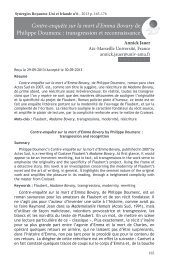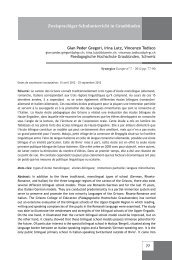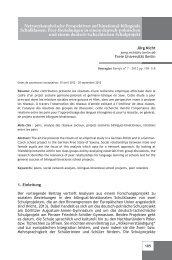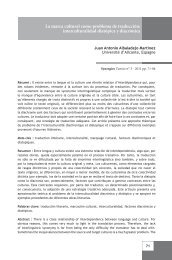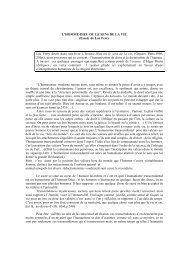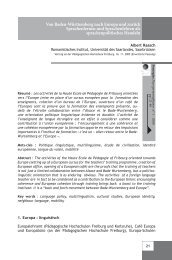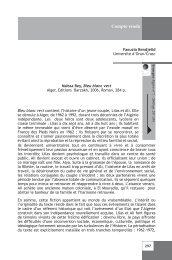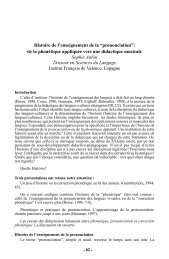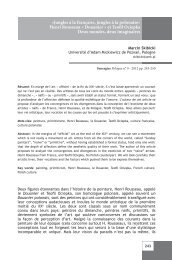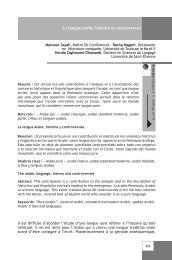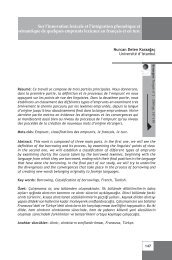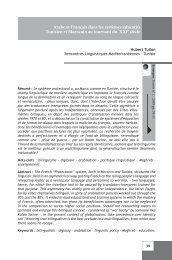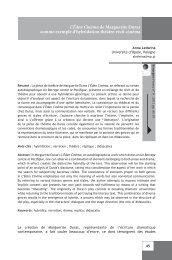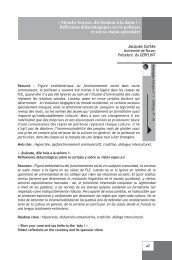Historical Dissent, the Ligue des droits de l'homme, and the Origins of
Historical Dissent, the Ligue des droits de l'homme, and the Origins of
Historical Dissent, the Ligue des droits de l'homme, and the Origins of
Create successful ePaper yourself
Turn your PDF publications into a flip-book with our unique Google optimized e-Paper software.
The Enduring Legacy <strong>of</strong> 1914: <strong>Historical</strong> <strong>Dissent</strong>, <strong>the</strong> <strong>Ligue</strong> <strong><strong>de</strong>s</strong><br />
<strong>droits</strong> <strong>de</strong> l’homme, <strong>and</strong> <strong>the</strong> <strong>Origins</strong> <strong>of</strong> ‘Pacifisme nouveau style’<br />
Norman Ingram<br />
Concordia University, Montreal<br />
Summary: One <strong>of</strong> <strong>the</strong> cornerstones <strong>of</strong> <strong>the</strong> new pacifism which emerged<br />
in France at <strong>the</strong> very end <strong>of</strong> <strong>the</strong> 1920s was a pr<strong>of</strong>ound historical dissent,<br />
particularly with regard to <strong>the</strong> origins <strong>of</strong> <strong>the</strong> Great War. The locus <strong>of</strong> that<br />
<strong>de</strong>bate over <strong>the</strong> entire interwar period was most <strong>of</strong>ten <strong>the</strong> <strong>Ligue</strong> <strong><strong>de</strong>s</strong> <strong>droits</strong><br />
<strong>de</strong> l’homme (LDH), that quintessentially republican, cross-party political<br />
organisation which in so many ways <strong>de</strong>fined republican politics between<br />
<strong>the</strong> wars. For French pacifists, more so than for <strong>the</strong>ir British counterparts,<br />
<strong>the</strong> question <strong>of</strong> historical dissent, <strong>of</strong> <strong>the</strong> legitimacy <strong>of</strong> <strong>the</strong> last war, <strong>of</strong><br />
<strong>the</strong> Great War, was integral to <strong>the</strong>ir political vision <strong>of</strong> peace. Central to<br />
that vision <strong>of</strong> peace was not <strong>the</strong> couple franco-britannique, but ra<strong>the</strong>r <strong>the</strong><br />
festering relationship between France <strong>and</strong> Germany. This article examines,<br />
<strong>the</strong>refore, <strong>the</strong> pacifist trajectory within <strong>the</strong> largest interwar, non-partisan,<br />
republican political organisation in France, <strong>the</strong> <strong>Ligue</strong> <strong><strong>de</strong>s</strong> <strong>droits</strong> <strong>de</strong> l’homme.<br />
The <strong>Ligue</strong> was riven over <strong>the</strong> entire interwar period by <strong>de</strong>bates on pacifism, peace, <strong>the</strong><br />
Peace, <strong>and</strong> <strong>the</strong> relationship <strong>of</strong> France with Germany. It makes an i<strong>de</strong>al case study <strong>of</strong><br />
<strong>the</strong> pacifist impulse <strong>and</strong> its origins. Some might argue that it was pacifism which killed<br />
<strong>the</strong> <strong>Ligue</strong> <strong><strong>de</strong>s</strong> <strong>droits</strong> <strong>de</strong> l’homme by 1939. In fact, this paper maintains that it was <strong>the</strong><br />
festering legacy <strong>of</strong> <strong>the</strong> German problem, <strong>the</strong> problem <strong>of</strong> 1914, which both begat <strong>the</strong><br />
new pacifism <strong>and</strong> at <strong>the</strong> same time ultimately <strong><strong>de</strong>s</strong>troyed it <strong>and</strong> <strong>the</strong> <strong>Ligue</strong>.<br />
Keywords: France, Germany, interwar pacifism, origins <strong>of</strong> <strong>the</strong> Great War, historical<br />
dissent, <strong>Ligue</strong> <strong><strong>de</strong>s</strong> <strong>droits</strong> <strong>de</strong> l’homme.<br />
Résumé: Une <strong><strong>de</strong>s</strong> pierres angulaires du nouveau pacifisme qui a vu le jour en France tout<br />
à la fin <strong><strong>de</strong>s</strong> années vingt était une pr<strong>of</strong>on<strong>de</strong> dissi<strong>de</strong>nce historique, en particulier vis-àvis<br />
<strong><strong>de</strong>s</strong> origines <strong>de</strong> la Gran<strong>de</strong> Guerre. Pendant toute la pério<strong>de</strong> <strong>de</strong> l’entre-<strong>de</strong>ux-guerres<br />
ce débat se déroulait au sein <strong>de</strong> la <strong>Ligue</strong> <strong><strong>de</strong>s</strong> <strong>droits</strong> <strong>de</strong> l’homme (LDH), l’organisation<br />
républicaine par excellence qui a presque défini, à elle seule, la politique républicaine<br />
entre les guerres. Pour les pacifistes français, plus que pour leurs homologues<br />
britanniques, la question <strong>de</strong> la dissi<strong>de</strong>nce historique, <strong>de</strong> la légitimité <strong>de</strong> la <strong>de</strong>rnière<br />
guerre, <strong>de</strong> la Gran<strong>de</strong> Guerre, faisait partie intégrante <strong>de</strong> leur vision <strong>de</strong> la paix. Cette<br />
vision <strong>de</strong> la paix tournait non pas autour du couple franco-britannique, mais en revanche<br />
autour <strong>de</strong> la relation ulcéreuse entre la France et l’Allemagne. Cet article examine<br />
donc la trajectoire pacifiste à l’intérieur <strong>de</strong> la plus gran<strong>de</strong> organisation politique<br />
républicaine en France, la <strong>Ligue</strong> <strong><strong>de</strong>s</strong> <strong>droits</strong> <strong>de</strong> l’homme. La <strong>Ligue</strong> était pr<strong>of</strong>ondément<br />
85<br />
Synergies Royaume-Uni et Irlan<strong>de</strong> n° 4 - 2011<br />
pp. 85-94
divisée à travers l’entre-<strong>de</strong>ux-guerres par <strong><strong>de</strong>s</strong> débats sur le pacifisme, la paix, La paix,<br />
et aussi sur la relation <strong>de</strong> la France à l’Allemagne. Cette relation en fait une excellente<br />
étu<strong>de</strong> sur le pacifisme et ses origines. D’aucuns diraient que le pacifisme avait déjà tué<br />
la <strong>Ligue</strong> <strong><strong>de</strong>s</strong> <strong>droits</strong> <strong>de</strong> l’homme en 1939. En effet, le présent article soutient l’argument<br />
que c’est l’héritage difficile du problème allem<strong>and</strong>, du problème <strong>de</strong> 1914, qui non<br />
seulement a donné naissance au nouveau pacifisme, mais aussi, en même temps, a fini<br />
par l’anéantir et avec lui la <strong>Ligue</strong> <strong><strong>de</strong>s</strong> <strong>droits</strong> <strong>de</strong> l’homme.<br />
Mots-clés : France, Allemagne, pacifisme <strong>de</strong> l’entre-<strong>de</strong>ux-guerres, origines <strong>de</strong> la Gran<strong>de</strong><br />
Guerre, dissi<strong>de</strong>nce historique, <strong>Ligue</strong> <strong><strong>de</strong>s</strong> <strong>droits</strong> <strong>de</strong> l’homme.<br />
One <strong>of</strong> <strong>the</strong> cornerstones <strong>of</strong> <strong>the</strong> new pacifism which emerged in France at <strong>the</strong> very end<br />
<strong>of</strong> <strong>the</strong> 1920s was a pr<strong>of</strong>ound historical dissent, particularly with regard to <strong>the</strong> origins <strong>of</strong><br />
<strong>the</strong> Great War (Ingram, 1991: 122–25). The locus <strong>of</strong> that <strong>de</strong>bate over <strong>the</strong> entire interwar<br />
period was most <strong>of</strong>ten <strong>the</strong> <strong>Ligue</strong> <strong><strong>de</strong>s</strong> <strong>droits</strong> <strong>de</strong> l’homme (LDH), <strong>the</strong> quintessentially<br />
republican, cross-party political organisation which in so many ways <strong>de</strong>fined republican<br />
politics between <strong>the</strong> wars. Unlike what Martin Cea<strong>de</strong>l has called <strong>the</strong> “force pacifism” <strong>of</strong><br />
<strong>the</strong> British peace movement, a more ethically-inspired vision <strong>of</strong> peace which rejected<br />
<strong>the</strong> instrumental use <strong>of</strong> force, interwar French pacifism was avowedly political. It was<br />
what Cea<strong>de</strong>l would call “war pacifism”, even an “international war pacifism” (Cea<strong>de</strong>l,<br />
1987). What was objected to was war itself. This means that for French pacifists, more<br />
so than for <strong>the</strong>ir British counterparts, <strong>the</strong> question <strong>of</strong> historical dissent, <strong>of</strong> <strong>the</strong> legitimacy<br />
<strong>of</strong> <strong>the</strong> last war, <strong>of</strong> <strong>the</strong> Great War, was integral to <strong>the</strong>ir political vision <strong>of</strong> peace. Central<br />
to that view <strong>of</strong> peace <strong>and</strong> <strong>of</strong> post-war politics was not <strong>the</strong> couple franco-britannique,<br />
but ra<strong>the</strong>r <strong>the</strong> festering relationship between France <strong>and</strong> Germany.<br />
The apparent implosion <strong>of</strong> <strong>the</strong> LDH following <strong>the</strong> collapse <strong>of</strong> France in 1940 can, in fact,<br />
be imputed directly to <strong>the</strong> <strong>Ligue</strong>’s position during <strong>the</strong> Great War <strong>and</strong> subsequently on <strong>the</strong><br />
question <strong>of</strong> war origins <strong>and</strong> war responsibilities. All else flows from <strong>the</strong> original political<br />
position <strong>of</strong> support for <strong>the</strong> Union sacrée, which was staked out by <strong>the</strong> <strong>Ligue</strong>’s lea<strong>de</strong>rship<br />
in 1914–15. Unremarked upon at <strong>the</strong> time, it was <strong>the</strong> effect on <strong>the</strong> <strong>Ligue</strong> <strong>of</strong> <strong>the</strong> events<br />
<strong>of</strong> <strong>the</strong> Great War which would provoke its ultimate <strong>de</strong>mise, a sli<strong>de</strong> into political oblivion<br />
that was complete by 1939 – in short, before <strong>the</strong> Nazi invasion <strong>of</strong> 1940 – <strong>and</strong> from which<br />
<strong>the</strong> LDH has never fully recovered. By <strong>the</strong> time <strong>the</strong> Nazis arrived in France in 1940, <strong>the</strong><br />
LDH was a carapace <strong>of</strong> what it had been only five years earlier (Ingram, 2008, Ingram,<br />
1999). The two world wars are thus intimately linked, not only in German, but also in<br />
French history. It was not pacifism which killed <strong>the</strong> <strong>Ligue</strong> <strong><strong>de</strong>s</strong> <strong>droits</strong> <strong>de</strong> l’homme, as some<br />
might be tempted to argue, but ra<strong>the</strong>r <strong>the</strong> contested legacy, <strong>the</strong> moral <strong>and</strong> political<br />
ambiguities <strong>of</strong> 1914 (Ingram, 2010a; Ingram, 2010b).<br />
It was this same contested legacy which ultimately <strong><strong>de</strong>s</strong>troyed French pacifism, as well.<br />
If, as Cea<strong>de</strong>l argues (Cea<strong>de</strong>l, 1981), British pacifism became an “ethic <strong>of</strong> ultimate ends”,<br />
using a Weberian analogy, <strong>the</strong>n in <strong>the</strong> French case pacifism became a “politics <strong>of</strong> ultimate<br />
ends”. The political nature <strong>of</strong> French pacifism in turn was based on a <strong>de</strong>ep historical<br />
dissent with roots extending back to <strong>the</strong> earliest days <strong>of</strong> <strong>the</strong> Union sacrée in 1914. Thus,<br />
while common cause could be, <strong>and</strong> was, ma<strong>de</strong> with British pacifists in <strong>the</strong> interwar period,<br />
<strong>the</strong> actual motor <strong>of</strong> French pacifism was <strong>the</strong> mißlungene Verhältnis with Germany.<br />
86<br />
Synergies Royaume-Uni et Irlan<strong>de</strong> n° 4 - 2011 pp. 85-94<br />
Norman Ingram
The locus in quo <strong>of</strong> this <strong>de</strong>velopment in France was <strong>the</strong> <strong>Ligue</strong> <strong><strong>de</strong>s</strong> <strong>droits</strong> <strong>de</strong> l’homme.<br />
For <strong>the</strong> majority within <strong>the</strong> <strong>Ligue</strong>, German war guilt was incontrovertible. It was used<br />
to justify <strong>and</strong> explain France’s titanic struggle against Germany during <strong>the</strong> Great War.<br />
Once enunciated, <strong>the</strong> <strong>Ligue</strong> clung doggedly to it in <strong>the</strong> face <strong>of</strong> all evi<strong>de</strong>nce to <strong>the</strong><br />
contrary, until at last Hitler <strong>and</strong> <strong>the</strong> Nazis seemed to provi<strong>de</strong> <strong>the</strong>m with an ex post facto<br />
rationalisation for <strong>the</strong>ir pre-1933 political positions.<br />
Along <strong>the</strong> way from 1914 to 1939 what hamstrung <strong>the</strong> <strong>Ligue</strong> <strong><strong>de</strong>s</strong> <strong>droits</strong> <strong>de</strong> l’homme <strong>the</strong>n<br />
was <strong>the</strong> contested legacy <strong>of</strong> <strong>the</strong> First World War. Three different discourses on <strong>the</strong> issues<br />
at stake in 1914 occurred in <strong>the</strong> first year <strong>and</strong> a half <strong>of</strong> <strong>the</strong> war, <strong>the</strong> sum total <strong>of</strong> which<br />
was pregnant with consequences for <strong>the</strong> future. First, if one examines <strong>Ligue</strong> discussions<br />
<strong>of</strong> <strong>the</strong> dangers posed to France in early 1914 before <strong>the</strong> July Crisis, <strong>the</strong>se dangers were<br />
conceived in uniquely domestic terms. Alsace-Lorraine was barely on <strong>the</strong> radar screen,<br />
<strong>and</strong> <strong>the</strong> danger did not come from across <strong>the</strong> Rhine. Secondly, once <strong>the</strong> war began,<br />
a sud<strong>de</strong>n shift in <strong>Ligue</strong> thinking occurred, <strong>and</strong> Germany was now singled out as <strong>the</strong><br />
nation par excellence where <strong>de</strong>mocracy was lacking, <strong>the</strong>reby justifying a kind <strong>of</strong> secular<br />
crusa<strong>de</strong> against an infi<strong>de</strong>l Reich. Thirdly, however, <strong>the</strong>re was an inconvenient truth, <strong>and</strong><br />
this was that Russia was France’s ally. <strong>Ligue</strong> spokesmen paradoxically began to insist that<br />
Russia was, in fact, a liberal <strong>de</strong>mocracy.<br />
I. The Enemy is Within<br />
The Enduring Legacy <strong>of</strong> 1914: <strong>Historical</strong> <strong>Dissent</strong>,<br />
<strong>the</strong> <strong>Ligue</strong> <strong><strong>de</strong>s</strong> <strong>droits</strong> <strong>de</strong> l’homme, <strong>and</strong> <strong>the</strong> <strong>Origins</strong> <strong>of</strong> ‘Pacifisme nouveau style’<br />
The year 1914 opened for <strong>the</strong> <strong>Ligue</strong> <strong><strong>de</strong>s</strong> <strong>droits</strong> <strong>de</strong> l’homme like many o<strong>the</strong>rs. For <strong>the</strong> <strong>Ligue</strong>’s<br />
presi<strong>de</strong>nt, Francis <strong>de</strong> Pressensé, <strong>the</strong> great issues facing <strong>the</strong> LDH were essentially domestic<br />
<strong>and</strong> internal. The Republican tradition <strong>and</strong> <strong>the</strong> heritage <strong>of</strong> 1789 were threatened by a<br />
reactionary ten<strong>de</strong>ncy in French politics that went all <strong>the</strong> way back to <strong>the</strong> Second Empire.<br />
Only in a fleeting mention <strong>of</strong> <strong>the</strong> danger posed by what he called a “panic militarism”<br />
could one construe any reference to events to come outsi<strong>de</strong> France. Instead, <strong>the</strong> real<br />
danger was essentially <strong>the</strong> Action française (De Pressensé, 1914: 1–2).<br />
The enemy at <strong>the</strong> beginning <strong>of</strong> 1914 was <strong>the</strong>refore not specifically German, even if, as<br />
will become clear, <strong>the</strong>re was consi<strong>de</strong>rable anxiety about Alsace-Lorraine <strong>and</strong>, increasingly,<br />
Germany. The German question was merely one amongst many. The <strong>Ligue</strong> seemed far<br />
more concerned with issues such as alcoholism, reform <strong>of</strong> <strong>the</strong> police, prostitution <strong>and</strong><br />
sexual hygiene, <strong>and</strong> <strong>the</strong> innumerable claims ma<strong>de</strong> on its time <strong>and</strong> resources by French<br />
people who had fallen foul <strong>of</strong> <strong>the</strong> administrative law. 1 That said, <strong>the</strong> German problem<br />
was on <strong>the</strong> horizon. The Ar<strong>de</strong>nnes fe<strong>de</strong>ration, in its meeting <strong>of</strong> 16 November 1913, <strong>and</strong><br />
perhaps largely un<strong>de</strong>r <strong>the</strong> impetus <strong>of</strong> Jeanne Mélin, who was to have an important career<br />
as a pacifist militant in <strong>the</strong> interwar period (Ingram, 1991: 88) 2 , passed a motion protesting<br />
in <strong>the</strong> strongest possible terms “<strong>the</strong> chauvinist excitations which, on both si<strong><strong>de</strong>s</strong> <strong>of</strong> <strong>the</strong><br />
bor<strong>de</strong>r, threaten to aggravate <strong>the</strong> antagonism <strong>of</strong> <strong>the</strong> two countries”, an antagonism which<br />
<strong>the</strong> motion consi<strong>de</strong>red disastrous not only for France <strong>and</strong> Germany, but for civilisation in<br />
its entirety. It <strong>de</strong>man<strong>de</strong>d a Franco-German rapprochement, which it saw as <strong>the</strong> only means<br />
<strong>of</strong> equitably resolving <strong>the</strong> festering Alsace-Lorraine question (Anon., 1 January 1914: 50).<br />
The interesting thing, given what was to follow, was <strong>the</strong> insistence on a shared problem,<br />
that <strong>of</strong> chauvinist excitement on both si<strong><strong>de</strong>s</strong> <strong>of</strong> <strong>the</strong> frontier. Chauvinism was certainly not<br />
exclusively German. In sentiments which were to be echoed after <strong>the</strong> war by some German<br />
pacifists in <strong>the</strong> pages <strong>of</strong> Die Weltbühne (Ströbel, 1920: 417) 3 , <strong>the</strong> semi-<strong>of</strong>ficial organ <strong>of</strong><br />
<strong>the</strong> Deutsche Liga für Menschenrechte (DLfM), militarism <strong>and</strong> super-heated nationalism<br />
87
were seen as a common Franco-German problem, <strong>and</strong> not <strong>the</strong> province <strong>of</strong> Germany alone.<br />
Even “barbarism”, which was to enjoy such a long <strong>and</strong> storied career as a favoured trope<br />
<strong>of</strong> French propag<strong>and</strong>ists excoriating <strong>the</strong> German variant, seemed in early 1914 to be first<br />
<strong>and</strong> foremost a French problem – at least as far as <strong>the</strong> Dreyfusard Left was concerned.<br />
Jean Jaurès, speaking at <strong>the</strong> funeral <strong>of</strong> Francis <strong>de</strong> Pressensé in February 1914, stressed<br />
<strong>the</strong> extent to which France itself was infected by <strong>the</strong> anti-intellectual virus <strong>of</strong> intuition,<br />
as opposed to reason, <strong>and</strong> called French youth <strong>and</strong> <strong>the</strong> <strong>Ligue</strong> to arms to “counter <strong>the</strong><br />
ignominy <strong>of</strong> <strong>the</strong> inferior forces <strong>of</strong> barbarism which claim, with an unheard <strong>of</strong> insolence,<br />
to be <strong>the</strong> guardians <strong>of</strong> French civilisation” (Jaurès, 1914: 176) – yet again a not-so-veiled<br />
attack on <strong>the</strong> Action française.<br />
In fact, during <strong>the</strong> first few months <strong>of</strong> 1914, before Europe spiralled into war, one could quite<br />
easily make <strong>the</strong> case that <strong>the</strong> <strong>Ligue</strong>’s gaze was directed inwards, that in much <strong>of</strong> <strong>the</strong> rhetoric<br />
<strong>of</strong> its speakers <strong>and</strong> in <strong>the</strong> motions passed by many <strong>of</strong> its sections, <strong>the</strong> great danger continued<br />
to be <strong>the</strong> perceived unholy domestic alliance <strong>of</strong> church <strong>and</strong> military. No less a person than<br />
Henri Guernut, <strong>the</strong> secretary general <strong>of</strong> <strong>the</strong> <strong>Ligue</strong>, argued in a speech on <strong>the</strong> “crisis <strong>of</strong> <strong>the</strong><br />
Republic” given at Chauny in <strong>the</strong> Aisne on 1 February 1914 that <strong>the</strong> danger came from <strong>the</strong><br />
“militarist <strong>and</strong> clerical reaction” (Guernut, 1914: 506). Many were <strong>the</strong> sections, too, that<br />
continued to pass motions con<strong>de</strong>mning <strong>the</strong> three-year military service law <strong>of</strong> 1913, <strong>and</strong> <strong>the</strong><br />
<strong>of</strong>ten harsh sentences meted out to young soldiers <strong>of</strong> <strong>the</strong> previous class who had protested<br />
<strong>the</strong> sud<strong>de</strong>n extension <strong>of</strong> <strong>the</strong>ir period <strong>of</strong> service from two years to three.<br />
II. A Crusa<strong>de</strong> for Democracy<br />
The 1 July 1914 issue was <strong>the</strong> last number <strong>of</strong> <strong>the</strong> Bulletin <strong>of</strong>ficiel <strong>de</strong> la <strong>Ligue</strong> <strong><strong>de</strong>s</strong> <strong>droits</strong><br />
<strong>de</strong> l’homme published until April 1915. 4 The July Crisis intervened <strong>and</strong> <strong>the</strong> <strong>Ligue</strong> rallied<br />
around <strong>the</strong> Union sacrée. A large part <strong>of</strong> <strong>the</strong> Comité Central went to <strong>the</strong> colours in <strong>the</strong><br />
mobilisation or<strong>de</strong>r <strong>of</strong> 2 August 1914, <strong>and</strong> perhaps as a result <strong>of</strong> <strong>the</strong> lack <strong>of</strong> manpower, no<br />
minutes were taken at <strong>the</strong> meetings <strong>of</strong> August, September <strong>and</strong> October (Comité Central,<br />
1 January–1 April 1915: 19). 5<br />
Once <strong>the</strong> war began, a shift in <strong>Ligue</strong> thinking occurred, <strong>and</strong> Germany sud<strong>de</strong>nly became<br />
evil incarnate, a nation which had to be <strong>de</strong>feated precisely because <strong>of</strong> its un<strong>de</strong>mocratic<br />
nature. This putative lack <strong>of</strong> <strong>de</strong>mocracy was used as a sort <strong>of</strong> latter-day Jacobin<br />
justification for a crusa<strong>de</strong> against Germany. 6 Ferdin<strong>and</strong> Buisson, <strong>the</strong> <strong>Ligue</strong>’s new presi<strong>de</strong>nt<br />
following <strong>the</strong> sud<strong>de</strong>n <strong>de</strong>ath <strong>of</strong> Francis <strong>de</strong> Pressensé in January 1914, <strong>de</strong>clared that for<br />
<strong>the</strong> <strong>Ligue</strong>, <strong>the</strong> First World War was a “<strong>de</strong>mocratic crusa<strong>de</strong> <strong>of</strong> <strong>de</strong>liverance” – <strong>de</strong>liverance<br />
first <strong>of</strong> all <strong>of</strong> Belgium, secondly <strong>of</strong> all countries “annexed by force <strong>and</strong> oppressed”,<br />
<strong>and</strong> lastly, in a clear reference to <strong>the</strong> perceived danger posed by German militarism,<br />
<strong>de</strong>liverance <strong>of</strong> “Europe, which is compelled, if it wishes to live in peace, to extinguish<br />
by floods <strong>of</strong> blood <strong>the</strong> hearth <strong>of</strong> perpetual fire”. Buisson en<strong>de</strong>d by reminding his rea<strong>de</strong>rs<br />
that it was France which had taken this “generous <strong>and</strong> redoubtable initiative”, <strong>and</strong> that<br />
as a consequence, its very existence was at stake (Buisson, 1 January–1 April 1915: 10).<br />
The most important <strong>Ligue</strong> statement on <strong>the</strong> war was a short book by Victor Basch (Basch,<br />
1915), which originally appeared in <strong>the</strong> Bulletin in May 1915, but was published as a<br />
book later that year. Originally entitled “La <strong>Ligue</strong> <strong><strong>de</strong>s</strong> <strong>droits</strong> <strong>de</strong> l’homme et la guerre”<br />
(Basch, 1 May 1915: 65-175), it served as <strong>the</strong> point <strong>of</strong> <strong>de</strong>parture for all <strong>Ligue</strong> <strong>de</strong>bates on<br />
war origins <strong>and</strong> pacifism right through to <strong>the</strong> <strong>Ligue</strong>’s collapse in 1940.<br />
88<br />
Synergies Royaume-Uni et Irlan<strong>de</strong> n° 4 - 2011 pp. 85-94<br />
Norman Ingram
The Enduring Legacy <strong>of</strong> 1914: <strong>Historical</strong> <strong>Dissent</strong>,<br />
<strong>the</strong> <strong>Ligue</strong> <strong><strong>de</strong>s</strong> <strong>droits</strong> <strong>de</strong> l’homme, <strong>and</strong> <strong>the</strong> <strong>Origins</strong> <strong>of</strong> ‘Pacifisme nouveau style’<br />
The essential question according to Basch was to know which nation was <strong>the</strong> aggressor,<br />
<strong>and</strong> whe<strong>the</strong>r France had done everything in its power to avoid war <strong>and</strong> preserve peace.<br />
This was <strong>the</strong> question he set out to answer by a close reading <strong>of</strong> <strong>the</strong> coloured books 7<br />
published by <strong>the</strong> various powers on <strong>the</strong> origins <strong>of</strong> <strong>the</strong> war. Basch recognised, as in<strong>de</strong>ed<br />
do virtually all recent historians (Williamson <strong>and</strong> May, June 2007: 335-387), that <strong>the</strong><br />
causes <strong>of</strong> <strong>the</strong> Great War were many: some near, some distant, some visible, still o<strong>the</strong>rs<br />
invisible. He admitted that it was impossible to know with certainty which precise<br />
elements had led to <strong>the</strong> war, but he insisted never<strong>the</strong>less on <strong>the</strong> need to explain how he<br />
<strong>and</strong> those around him saw <strong>the</strong> origins <strong>of</strong> <strong>the</strong> war (Basch, 1 May 1915: 69).<br />
So, who was responsible for <strong>the</strong> outbreak <strong>of</strong> <strong>the</strong> war? According to Basch, after carefully<br />
reading <strong>the</strong> documents, “no doubt can persist as to <strong>the</strong> series <strong>of</strong> events that led to war<br />
or to <strong>the</strong> fixing <strong>of</strong> responsibilities” (Basch, 1 May 1915: 69). Basch conclu<strong>de</strong>d that, in <strong>the</strong><br />
first instance, “before any negotiations, Austrian diplomacy believed war with Serbia to be<br />
inevitable”. Secondly, in Basch’s view, it was incontrovertible that Germany was prepared<br />
to support <strong>the</strong> Dual Monarchy in what it viewed as <strong>the</strong> latter’s righteous <strong>de</strong>m<strong>and</strong>s. Thus,<br />
while <strong>the</strong> Entente powers, with <strong>the</strong> addition <strong>of</strong> Italy, sought a pacific solution to <strong>the</strong> crisis,<br />
only Germany was in favour <strong>of</strong> merely localising it (Basch, 1 May 1915: 72-74). He went<br />
through <strong>the</strong> various stages <strong>of</strong> <strong>the</strong> July Crisis minutely, <strong>and</strong> came to <strong>the</strong> conclusion that<br />
Germany was <strong>the</strong> main culprit because it alone <strong>of</strong> <strong>the</strong> great powers seemed to refuse <strong>the</strong><br />
possibility <strong>of</strong> conciliation, particularly after <strong>the</strong> Russian general mobilisation <strong>of</strong> 31 July.<br />
While Austria appeared prepared to consi<strong>de</strong>r measures aimed at <strong>de</strong>fusing <strong>the</strong> crisis, <strong>the</strong><br />
German position actually har<strong>de</strong>ned, according to Basch (Basch, 1 May 1915: 91-92). The<br />
violation <strong>of</strong> Belgian neutrality by <strong>the</strong> Germans, which Niall Ferguson claims <strong>the</strong> British<br />
were prepared to do as well (Ferguson, 1999: 443), set <strong>the</strong> tin<strong>de</strong>r ablaze.<br />
It was clear, <strong>the</strong>refore, to Basch at least, that Germany <strong>and</strong> Austria were responsible<br />
for starting <strong>the</strong> war; Austria because it had <strong>de</strong>clared war on Serbia initially, a war it<br />
knew would lead to a European conflagration, <strong>and</strong> Germany because it did not rein in<br />
its Austrian ally (Basch, 1 May 1915: 97-101). This, <strong><strong>de</strong>s</strong>pite <strong>the</strong> fact that Basch agreed<br />
with <strong>the</strong> notion that Austria had <strong>the</strong> right to chastise Serbia; how this might have been<br />
achieved without engaging <strong>the</strong> Russians was left unexplained.<br />
III. The Principle <strong>of</strong> Nationalities <strong>and</strong> <strong>the</strong> Problem <strong>of</strong> Russia<br />
If <strong>the</strong> <strong>Ligue</strong> supported <strong>the</strong> Union sacrée <strong>and</strong> <strong>the</strong> French war effort out <strong>of</strong> a <strong>de</strong>ep-seated<br />
Jacobin republicanism <strong>and</strong> a <strong><strong>de</strong>s</strong>ire to see Alsace-Lorraine return to <strong>the</strong> French fold,<br />
it did so also because it believed, in <strong>the</strong> words <strong>of</strong> Lloyd George, that “this is a war <strong>of</strong><br />
nationalities” (Lloyd George cited in Ruyssen, January 1916: 1). Théodore Ruyssen, in<br />
a long-awaited essay on “The Problem <strong>of</strong> Nationalities”, published in January 1916,<br />
recognised that this question did not merely concern <strong>the</strong> Balkans, Serbia, or Belgium,<br />
but that any “enlightened observer” in 1914 should have been able to see that <strong>the</strong>re<br />
were o<strong>the</strong>r areas <strong>of</strong> Europe where <strong>the</strong> nationality question was thorny: Pol<strong>and</strong>, <strong>the</strong><br />
Ukraine, Lithuania, to name but a few.<br />
Happily for Ruyssen’s analysis, Russia seemed to have moved to <strong>the</strong> si<strong>de</strong> <strong>of</strong> right in <strong>the</strong><br />
first month <strong>of</strong> <strong>the</strong> war by announcing to <strong>the</strong> Poles that <strong>the</strong>y would have complete political<br />
autonomy, <strong>and</strong> guaranteeing to Russian Jews <strong>the</strong> same rights as <strong>the</strong>ir Orthodox compatriots.<br />
This, <strong><strong>de</strong>s</strong>pite <strong>the</strong> fact, that <strong>the</strong> Comité Central had, at its meeting <strong>of</strong> 22 March 1915, heard<br />
89
a report read by none o<strong>the</strong>r than Victor Basch “on <strong>the</strong> lamentable situation <strong>of</strong> Russian<br />
Jews since <strong>the</strong> war” (my emphasis) (Comité Central, 1-15 December 1915: 448).<br />
The putative change in Russian practice seems to have allowed Ruyssen to state<br />
categorically that with <strong>the</strong> era <strong>of</strong> wars <strong>of</strong> religion <strong>de</strong>finitely over – Protestant Berlin,<br />
Catholic Vienna, <strong>and</strong> Muslim Constantinople were allies, after all – what created <strong>the</strong><br />
“natural <strong>and</strong> necessary solidarity” between <strong>the</strong> central powers was that none <strong>of</strong> <strong>the</strong>m<br />
had “ever known how, or wanted, to accord justice to peoples <strong>the</strong>y had conquered”<br />
– <strong>de</strong>mocracy, in o<strong>the</strong>r words (Ruyssen, January 1916: 3). Interestingly, <strong>the</strong> reproach<br />
that Ruyssen ma<strong>de</strong> to all three empires was that none <strong>of</strong> <strong>the</strong>m had ever succee<strong>de</strong>d in<br />
“assimilating” <strong>the</strong> peoples it had conquered. The Germans could not “Germanise” <strong>the</strong><br />
Alsatians <strong>and</strong> Lorrainers, any more than <strong>the</strong> Habsburgs could bring or<strong>de</strong>r out <strong>of</strong> <strong>the</strong> chaos<br />
<strong>of</strong> an empire in which “at least a dozen heterogeneous, jealous, <strong>and</strong> hostile nationalities<br />
co-existed si<strong>de</strong> by si<strong>de</strong>, with none assuming a <strong>de</strong>cisive prepon<strong>de</strong>rance”. As for <strong>the</strong> Turks,<br />
<strong>the</strong> best that could be said <strong>of</strong> <strong>the</strong>m was that <strong>the</strong>y “camped” amongst conquered peoples<br />
“sword in h<strong>and</strong>” (Ruyssen, January 1916: 4).<br />
On <strong>the</strong> Allied si<strong>de</strong>, by comparison, <strong><strong>de</strong>s</strong>pite admitted difficulties in Irel<strong>and</strong>, North Africa,<br />
Finl<strong>and</strong> <strong>and</strong> Pol<strong>and</strong>, Ruyssen claimed that, “all things consi<strong>de</strong>red, <strong>the</strong> group <strong>of</strong> allied<br />
powers represents, in <strong>the</strong>ir struggle against <strong>the</strong> empires <strong>of</strong> force, <strong>the</strong> continuity <strong>of</strong> <strong>the</strong><br />
liberal tradition to which <strong>the</strong> newly-enfranchised nationalities owed <strong>the</strong>ir liberation in<br />
<strong>the</strong> course <strong>of</strong> <strong>the</strong> nineteenth century”. According to Ruyssen, “<strong>the</strong>re is hardly a national<br />
movement to which, separately or toge<strong>the</strong>r, France, Engl<strong>and</strong> <strong>and</strong> Russia have not lent<br />
<strong>the</strong> support ei<strong>the</strong>r <strong>of</strong> <strong>the</strong>ir political influence or <strong>of</strong> <strong>the</strong>ir arms” (Ruyssen, January 1916:<br />
6). Leaving asi<strong>de</strong> for a moment <strong>the</strong> <strong>de</strong>ci<strong>de</strong>dly difficult questions <strong>of</strong> Irel<strong>and</strong> <strong>and</strong> North<br />
Africa, it is nothing short <strong>of</strong> astounding to see <strong>the</strong> Russian Empire assimilated into <strong>the</strong><br />
camp <strong>of</strong> <strong>the</strong> liberal <strong>de</strong>mocracies.<br />
IV. From One War to <strong>the</strong> Next<br />
Does any <strong>of</strong> this matter? After all, <strong>the</strong> 1930s surely presented <strong>the</strong> <strong>Ligue</strong> <strong><strong>de</strong>s</strong> <strong>droits</strong> <strong>de</strong><br />
l’homme, to say nothing <strong>of</strong> <strong>the</strong> <strong>de</strong>mocratic project more generally, with starker choices<br />
<strong>and</strong> clearer issues than had been <strong>the</strong> case in 1914. On one level this is very true. Hitler<br />
undoubtedly represented something new <strong>and</strong> extraordinarily dangerous in German<br />
<strong>and</strong> European history. The bona fi<strong><strong>de</strong>s</strong> <strong>of</strong> a <strong>de</strong>mocratic crusa<strong>de</strong> against Germany was<br />
immeasurably stronger in 1939 than it had been in 1914. But on ano<strong>the</strong>r level, <strong>the</strong>re is<br />
a striking parallel between <strong>the</strong> political discourses <strong>of</strong> <strong>the</strong> second half <strong>of</strong> <strong>the</strong> thirties <strong>and</strong><br />
<strong>the</strong> first year <strong>of</strong> <strong>the</strong> Second World War on <strong>the</strong> one h<strong>and</strong>, <strong>and</strong> those we have examined<br />
from <strong>the</strong> 1914–15 period on <strong>the</strong> o<strong>the</strong>r, <strong><strong>de</strong>s</strong>pite <strong>the</strong> fact that <strong>the</strong> <strong>de</strong>bates <strong>of</strong> <strong>the</strong> 1930s<br />
seemed to be moving almost in slow motion compared to those <strong>of</strong> twenty years earlier.<br />
The year 1914 appears in retrospect to be a sud<strong>de</strong>n paradigm shift, whereas <strong>the</strong> run-up<br />
to <strong>the</strong> Second World War seems, on <strong>the</strong> contrary, to be tired, resigned <strong>and</strong> somewhat<br />
inevitable – a settling <strong>of</strong> old accounts. Ferdin<strong>and</strong> Buisson, <strong>the</strong> <strong>Ligue</strong>’s much-venerated<br />
Presi<strong>de</strong>nt recognised <strong>the</strong> paradigmatic importance <strong>of</strong> 1914 when he <strong>de</strong>fined <strong>the</strong> <strong>Ligue</strong>’s<br />
work in 1920 as primarily “<strong>the</strong> struggle in favour <strong>of</strong> <strong>the</strong> right <strong>of</strong> humanity to realize peace<br />
through international justice”. No longer was <strong>the</strong> <strong>Ligue</strong>’s fundamental remit <strong>the</strong> <strong>de</strong>fence<br />
<strong>of</strong> individual rights – even if that continued to occupy much <strong>of</strong> its time <strong>and</strong> energy – but<br />
ra<strong>the</strong>r henceforth <strong>the</strong> <strong>Ligue</strong> <strong><strong>de</strong>s</strong> <strong>droits</strong> <strong>de</strong> l’homme was engaged in an essentially political<br />
campaign in support <strong>of</strong> peace <strong>and</strong> collective rights, with “still more ardour than it had<br />
brought to <strong>the</strong> <strong>de</strong>fence <strong>of</strong> <strong>the</strong> rights <strong>of</strong> man <strong>and</strong> citizen” (Buisson, 1920: 3).<br />
90<br />
Synergies Royaume-Uni et Irlan<strong>de</strong> n° 4 - 2011 pp. 85-94<br />
Norman Ingram
The Enduring Legacy <strong>of</strong> 1914: <strong>Historical</strong> <strong>Dissent</strong>,<br />
<strong>the</strong> <strong>Ligue</strong> <strong><strong>de</strong>s</strong> <strong>droits</strong> <strong>de</strong> l’homme, <strong>and</strong> <strong>the</strong> <strong>Origins</strong> <strong>of</strong> ‘Pacifisme nouveau style’<br />
Thus, as in 1914, so in <strong>the</strong> 1930s, <strong>the</strong>re was a perceived internal enemy: domestic French<br />
fascism – what before <strong>the</strong> Great War had been called clerical-militarist reaction. The by<br />
now genuinely pacifist minority <strong>of</strong> <strong>the</strong> <strong>Ligue</strong> took to heart <strong>the</strong> arguments <strong>of</strong> yesteryear<br />
about <strong>the</strong> ongoing dangers posed to French <strong>de</strong>mocracy by <strong>the</strong> French extreme right, <strong>and</strong><br />
insisted that France had to sweep before its own door. The real enemy was not Hitler, it<br />
was Coty, Doriot, <strong>de</strong> la Rocque, <strong>and</strong> <strong>the</strong> o<strong>the</strong>r representatives <strong>of</strong> what was believed to be<br />
French fascism. 8<br />
The <strong>Ligue</strong>’s minority also refused to believe that <strong>the</strong> real danger lay across <strong>the</strong> Rhine. It<br />
refused to engage in a second Union sacrée, <strong>and</strong> <strong>de</strong>clined what it saw as <strong>the</strong> poisoned<br />
cup pr<strong>of</strong>fered to it in <strong>the</strong> form <strong>of</strong> a new crusa<strong>de</strong> <strong>of</strong> <strong>the</strong> <strong>de</strong>mocracies against external<br />
fascist threats. It rejected categorically Romain Roll<strong>and</strong>’s 1936 call for an “indivisible<br />
peace”, or, in o<strong>the</strong>r words, collective security (Roll<strong>and</strong>, 6 February 1936: 1; Pioch, 30<br />
January 1936: 1; Challaye, 6 February 1936: 1; Challaye, 19 March 1936: 2). 9<br />
As in 1914, so in <strong>the</strong> mid-1930s (until <strong>the</strong> Molotov-Ribbentrop Pact) <strong>and</strong> <strong>the</strong>n once again<br />
after June 1941, <strong>the</strong>re was also <strong>the</strong> Russian factor. Instrumental in <strong>the</strong> creation <strong>of</strong> <strong>the</strong><br />
Popular Front, <strong>the</strong> <strong>Ligue</strong> was torn apart by 1937 by <strong>the</strong> perceived need to support Soviet<br />
foreign policy <strong>and</strong> its domestic mouthpiece, <strong>the</strong> Parti communiste français. Once again,<br />
thinking it had learned <strong>the</strong> lessons <strong>of</strong> <strong>the</strong> recent past, <strong>the</strong> <strong>Ligue</strong>’s minority spurned <strong>the</strong><br />
Russian connection, believing support <strong>of</strong> French <strong>de</strong>mocracy utterly incompatible with<br />
support <strong>of</strong> an un<strong>de</strong>mocratic regime involved in <strong>the</strong> wholesale purging <strong>of</strong> large numbers <strong>of</strong><br />
its own citizens.<br />
The <strong>de</strong>mocratic traditions <strong>of</strong> a more distant Revolutionary past also came into sharper<br />
focus for <strong>the</strong> <strong>Ligue</strong>’s minority (Ingram, September 2004: 315–30). Drawing inspiration<br />
from <strong>the</strong> prewar Robespierre <strong>of</strong> 1791 <strong>and</strong> early 1792, <strong>the</strong> pacifist minority likened<br />
<strong>the</strong> impending crusa<strong>de</strong> <strong>of</strong> <strong>the</strong> <strong>de</strong>mocracies against Nazi Germany to <strong>the</strong> Girondin<br />
machinations in favour <strong>of</strong> war in 1791–2. Like a mantra, <strong>the</strong>y chanted Robespierrist<br />
slogans such as “<strong>the</strong> peoples do not like armed missionaries”, <strong>and</strong> “one does not bring<br />
freedom at <strong>the</strong> tip <strong>of</strong> a bayonet”, to indicate <strong>the</strong>ir <strong>de</strong>ep opposition to any crusa<strong>de</strong> for<br />
<strong>de</strong>mocracy. What <strong>the</strong>y did not see was that Hitler was different, <strong>and</strong> that <strong>the</strong> stakes had<br />
changed. Thus, to use <strong>the</strong> words <strong>of</strong> <strong>the</strong> titles <strong>of</strong> books by one <strong>of</strong> <strong>the</strong> minoritaires, what<br />
began as a critique <strong>of</strong> L’Evangile du Quai d’Orsay <strong>and</strong> Le My<strong>the</strong> <strong><strong>de</strong>s</strong> guerres <strong>de</strong> légitime<br />
défense, led ineluctably to La Légen<strong>de</strong> <strong><strong>de</strong>s</strong> démocraties pacifiques, only to end with <strong>the</strong><br />
horribly mistaken 1939: La Guerre <strong>de</strong> l’imposture, published in 1941 in occupied Paris<br />
(Demartial, 1926, 1931, 1939, 1941).<br />
The minority was hardly an inconsequential group. Its leading lights were highly<br />
articulate <strong>and</strong> visible public intellectuals, many <strong>of</strong> whom sat on <strong>the</strong> <strong>Ligue</strong>’s Comité<br />
Central. 10 Although its real numbers had undoubtedly shrunk by <strong>the</strong> time <strong>of</strong> <strong>the</strong> 1937<br />
Tours Congress <strong>of</strong> <strong>the</strong> <strong>Ligue</strong>, never<strong>the</strong>less <strong>the</strong> fact that just over eleven per cent <strong>of</strong> <strong>the</strong><br />
votes cast on <strong>the</strong> eve <strong>of</strong> ano<strong>the</strong>r world war went against <strong>the</strong> Comité Central’s motion<br />
on <strong>the</strong> best way to <strong>de</strong>fend both <strong>de</strong>mocracy <strong>and</strong> peace indicates that <strong>the</strong> <strong>the</strong>ses <strong>of</strong> <strong>the</strong><br />
minority continued to find a certain resonance within <strong>the</strong> larger <strong>Ligue</strong>.<br />
Mistaken <strong>the</strong> minoritaires might have been, but <strong>the</strong> moral conviction <strong>the</strong>y brought<br />
to <strong>the</strong> question is without doubt. They were convinced that 1914 had been a terrible<br />
civilisational mistake, <strong>and</strong> that France, <strong>the</strong> nation <strong>of</strong> <strong>the</strong> rights <strong>of</strong> man, bore a huge<br />
91
92<br />
Synergies Royaume-Uni et Irlan<strong>de</strong> n° 4 - 2011 pp. 85-94<br />
Norman Ingram<br />
responsibility in <strong>the</strong> outbreak <strong>of</strong> war. Everything else flowed from this appreciation.<br />
The rot (as <strong>the</strong>y saw it) in French domestic politics, <strong>the</strong> rise <strong>of</strong> <strong>the</strong> dictators, <strong>the</strong><br />
collapse <strong>of</strong> German <strong>de</strong>mocracy, <strong>the</strong> venomous state <strong>of</strong> European international relations,<br />
<strong>the</strong> impending Second World War, everything flowed from what <strong>the</strong>y believed to be<br />
<strong>the</strong> moral mistake <strong>of</strong> 1914. As Mathias Morhardt, <strong>the</strong> former secretary-general <strong>of</strong> <strong>the</strong><br />
<strong>Ligue</strong> <strong><strong>de</strong>s</strong> <strong>droits</strong> <strong>de</strong> l’homme, wrote in March 1936 in a letter to Georges Demartial, <strong>the</strong><br />
author <strong>of</strong> <strong>the</strong> four books cited above: “For <strong>the</strong> past twenty-two years, you <strong>and</strong> I have<br />
suffered an unspeakable moral <strong>and</strong> intellectual martyrdom... because we are expiating<br />
<strong>the</strong> honour <strong>of</strong> belonging to a class <strong>of</strong> Frenchmen that is far too small. We are those, in<br />
effect, who suffer more from an injustice committed by France than from an injustice<br />
committed against her.” (Mathias Morhardt, 19 March 1936) 11<br />
It is clear that <strong>the</strong> <strong>de</strong>ath agony <strong>of</strong> <strong>the</strong> <strong>Ligue</strong> <strong><strong>de</strong>s</strong> <strong>droits</strong> <strong>de</strong> l’homme began during <strong>the</strong><br />
Great War. There was a great <strong>de</strong>al <strong>of</strong> noisy political activity in <strong>the</strong> years following 1918.<br />
The <strong>Ligue</strong> did much that was good; interwar France would have been a poorer place<br />
without it. But like a slowly <strong>de</strong>veloping disease whose symptoms are not at first visible,<br />
<strong>the</strong> legacy <strong>of</strong> <strong>the</strong> First World War meant that over twenty years later, when <strong>the</strong> Nazis<br />
inva<strong>de</strong>d France, <strong>the</strong> <strong>Ligue</strong> <strong><strong>de</strong>s</strong> <strong>droits</strong> <strong>de</strong> l’homme was already in extremis.<br />
Bibliography<br />
Anon. (1 January 1914) ‘Communications <strong><strong>de</strong>s</strong> fédérations’, Bulletin <strong>of</strong>ficiel <strong>de</strong> la <strong>Ligue</strong> <strong><strong>de</strong>s</strong> <strong>droits</strong><br />
<strong>de</strong> l’homme 14, 1: 50.<br />
Basch, Victor (1 May 1915) ‘La <strong>Ligue</strong> <strong><strong>de</strong>s</strong> <strong>droits</strong> <strong>de</strong> l’homme et la guerre’, Bulletin <strong>of</strong>ficiel <strong>de</strong> la<br />
<strong>Ligue</strong> <strong><strong>de</strong>s</strong> <strong>droits</strong> <strong>de</strong> l’homme 15, 2: 65–175.<br />
Basch, Victor (1915) La Guerre <strong>de</strong> 1914 et le droit. Paris: <strong>Ligue</strong> <strong><strong>de</strong>s</strong> <strong>droits</strong> <strong>de</strong> l’homme.<br />
Buisson, Ferdin<strong>and</strong> (1 January–1 April 1915) ‘La <strong>Ligue</strong> <strong><strong>de</strong>s</strong> <strong>droits</strong> <strong>de</strong> l’homme et la guerre’, Bulletin<br />
<strong>of</strong>ficiel <strong>de</strong> la <strong>Ligue</strong> <strong><strong>de</strong>s</strong> <strong>droits</strong> <strong>de</strong> l’homme 15, 1: 10.<br />
Buisson, Ferdin<strong>and</strong> (5 January 1920) ‘Notre programme: <strong>droits</strong> <strong>de</strong> l’homme, <strong>droits</strong> du citoyen,<br />
<strong>droits</strong> <strong><strong>de</strong>s</strong> peuples’, Cahiers <strong><strong>de</strong>s</strong> <strong>droits</strong> <strong>de</strong> l’homme New Series 1: 3.<br />
Cea<strong>de</strong>l, Martin (1981) Pacifism in Britain: The Defining <strong>of</strong> a Faith, 1914–1945. Oxford: Clarendon<br />
Press.<br />
Cea<strong>de</strong>l, Martin (1987) Thinking about Peace <strong>and</strong> War. Oxford <strong>and</strong> New York: Oxford University Press.<br />
Challaye, Félicien (6 February 1936) ‘A propos <strong>de</strong> “l’indivisible paix”: Réponse à Romain Roll<strong>and</strong>’,<br />
Le Barrage 83: 1.<br />
Challaye, Félicien (19 March 1936) ‘Secon<strong>de</strong> réponse à Romain Roll<strong>and</strong>’, Le Barrage 90: 2.<br />
Comité Central (1–15 December 1915) ‘Séance du 22 mars 1915’, Bulletin <strong>of</strong>ficiel <strong>de</strong> la <strong>Ligue</strong> <strong><strong>de</strong>s</strong><br />
<strong>droits</strong> <strong>de</strong> l’homme 15, nos. 6 <strong>and</strong> 7: 448.<br />
Comité Central (1 January–1 April 1915) ‘Comité Central, Extraits, Séance du 30 juillet 1914’,<br />
Bulletin <strong>of</strong>ficiel <strong>de</strong> la <strong>Ligue</strong> <strong><strong>de</strong>s</strong> <strong>droits</strong> <strong>de</strong> l’homme 15, 1: 19.<br />
Demartial, Georges (1926) L’Evangile du Quai d’Orsay. Paris: André Delpeuch.<br />
Demartial, Georges (1931) Le my<strong>the</strong> <strong><strong>de</strong>s</strong> guerres <strong>de</strong> légitime défense. Paris: Rivière.<br />
Demartial, Georges (1939) La Légen<strong>de</strong> <strong><strong>de</strong>s</strong> démocraties pacifiques. Paris: Rie<strong>de</strong>r/Presses<br />
Universitaires <strong>de</strong> France.
The Enduring Legacy <strong>of</strong> 1914: <strong>Historical</strong> <strong>Dissent</strong>,<br />
<strong>the</strong> <strong>Ligue</strong> <strong><strong>de</strong>s</strong> <strong>droits</strong> <strong>de</strong> l’homme, <strong>and</strong> <strong>the</strong> <strong>Origins</strong> <strong>of</strong> ‘Pacifisme nouveau style’<br />
Demartial, Georges (1941) 1939: La guerre <strong>de</strong> l’imposture. Paris: Editions Jean Flory.<br />
Ferguson, Neil (1999) The Pity <strong>of</strong> War: Explaining World War I. New York: Basic Books.<br />
Guernut, Henri (15 April 1914) cited in Anon., ‘Communications <strong><strong>de</strong>s</strong> Sections’, Bulletin <strong>of</strong>ficiel <strong>de</strong><br />
la <strong>Ligue</strong> <strong><strong>de</strong>s</strong> <strong>droits</strong> <strong>de</strong> l’homme 14, 8: 506.<br />
Ingram, Norman (1991) The Politics <strong>of</strong> <strong>Dissent</strong>: Pacifism in France, 1919-1939. Oxford: Clarendon<br />
Press.<br />
Ingram, Norman (1999) ‘Defending <strong>the</strong> Rights <strong>of</strong> Man: <strong>the</strong> <strong>Ligue</strong> <strong><strong>de</strong>s</strong> <strong>droits</strong> <strong>de</strong> l’homme <strong>and</strong> <strong>the</strong><br />
Problem <strong>of</strong> Peace’ in Challenges to Mars: Essays on Pacifism from 1918 to 1945, ed. Peter Brock <strong>and</strong><br />
Thomas Socknat, pp. 117–33. Toronto: University <strong>of</strong> Toronto Press.<br />
Ingram, Norman (2004) ‘Repressed Memory Syndrome: Interwar French Pacifism <strong>and</strong> <strong>the</strong> Attempt to<br />
Recover France’s Pacifist Past’, French History 18, 3: 315–30.<br />
Ingram, Norman (2008) ‘Selbstmord or Euthanasia? Who Killed <strong>the</strong> <strong>Ligue</strong> <strong><strong>de</strong>s</strong> <strong>droits</strong> <strong>de</strong> l’homme?’,<br />
French History 22, 3: 337–57.<br />
Ingram, Norman (2010a) ‘La <strong>Ligue</strong> <strong><strong>de</strong>s</strong> <strong>droits</strong> <strong>de</strong> l’homme et le problème allem<strong>and</strong>’, Revue d’histoire<br />
diplomatique 124, 2: 119–31.<br />
Ingram, Norman (2010b) ‘A la Recherche d’une guerre gagnée: <strong>the</strong> <strong>Ligue</strong> <strong><strong>de</strong>s</strong> <strong>droits</strong> <strong>de</strong> l’homme <strong>and</strong><br />
<strong>the</strong> War Guilt Question (1918–1922)’, French History 24, 2: 218–35.<br />
Jaurès, Jean (1 February 1914) ‘A la Mémoire <strong>de</strong> Francis <strong>de</strong> Pressensé. Obsèques’, Bulletin <strong>of</strong>ficiel<br />
<strong>de</strong> la <strong>Ligue</strong> <strong><strong>de</strong>s</strong> <strong>droits</strong> <strong>de</strong> l’homme 14, 3: 176.<br />
Pioch, Georges (30 January 1936) ‘Questions à Romain Roll<strong>and</strong>’, Le Barrage 82: 1.<br />
De Pressensé, Francis (1 January 1914) ‘A nos <strong>Ligue</strong>urs’, Bulletin <strong>of</strong>ficiel <strong>de</strong> la <strong>Ligue</strong> <strong><strong>de</strong>s</strong> <strong>droits</strong> <strong>de</strong><br />
l’homme, 14, 1: 1–2.<br />
Roll<strong>and</strong>, Romain (6 February 1936) ‘L’indivisible paix’, Le Barrage 83: 1.<br />
Ruyssen, Théodore (January 1916) ‘Le Problème <strong><strong>de</strong>s</strong> nationalités’, Bulletin <strong>of</strong>ficiel <strong>de</strong> la <strong>Ligue</strong> <strong><strong>de</strong>s</strong><br />
<strong>droits</strong> <strong>de</strong> l’homme 16, 1: 1–64.<br />
Ströbel, Heinrich (15 April 1920) ‘Zwischen zwei Militarismen’, Die Weltbühne XVI, 16: 417.<br />
Williamson, Samuel R. Jr, <strong>and</strong> May, Ernest R. (June 2007) ‘An I<strong>de</strong>ntity <strong>of</strong> Opinion: Historians <strong>and</strong> July<br />
1914’, Journal <strong>of</strong> Mo<strong>de</strong>rn History 79: 335–87.<br />
Archives<br />
Archives <strong>de</strong> la <strong>Ligue</strong> <strong><strong>de</strong>s</strong> Droits <strong>de</strong> l’Homme, Bibliothèque <strong>de</strong> documentation internationale<br />
contemporaire, Nanterre. F∆Rés 798/7 (Correspondance <strong>de</strong> Mathias Morhardt).<br />
Correspondance Jeanne Mélin, Fonds Bouglé, Bibliothèque historique <strong>de</strong> la ville <strong>de</strong> Paris.<br />
Archives <strong>de</strong> la Préfecture <strong>de</strong> Police, Paris.<br />
Notes<br />
1 The emphasis on domestic issues even exten<strong>de</strong>d to an early meeting <strong>of</strong> <strong>the</strong> Société d’Etu<strong><strong>de</strong>s</strong><br />
Documentaires et Critique sur la Guerre, where one member wrote in a letter to Michel Alex<strong>and</strong>re<br />
that he thought <strong>the</strong> only two essential questions in early 1916 were <strong>the</strong> fight against alcoholism <strong>and</strong><br />
that against neo-Malthusianism! See unsigned police report dated 20 March 1915 in Archives <strong>de</strong> la<br />
Préfecture <strong>de</strong> Police, BA. 1775.<br />
2 The “Correspondance Jeanne Mélin” is available in <strong>the</strong> Fonds Bouglé at <strong>the</strong> Bibliothèque historique<br />
<strong>de</strong> la ville <strong>de</strong> Paris.<br />
93
94<br />
Synergies Royaume-Uni et Irlan<strong>de</strong> n° 4 - 2011 pp. 85-94<br />
Norman Ingram<br />
3 Ströbel wrote, with regard to <strong>the</strong> occupation <strong>of</strong> Darmstadt, Frankfurt <strong>and</strong> Homburg by French<br />
troops, that “French militarism has appeared as <strong>the</strong> helpmate <strong>of</strong> German militarism, if not<br />
consciously, <strong>the</strong>n at least <strong>de</strong> facto. Because every nationalist wave causes militarism to crest, <strong>and</strong><br />
<strong>the</strong> French military action (‘Einmarsch’ in <strong>the</strong> Ruhr in 1920) stimulates nationalist instincts.”<br />
4 The first number <strong>of</strong> <strong>the</strong> Bulletin in 1915 covered <strong>the</strong> period 1 January to 1 April 1915.<br />
5 Members mobilised with <strong>the</strong> secretary general, Henri Guernut, were Célestin Bouglé, Emile Glay,<br />
Sicard <strong>de</strong> Plauzoles, Georges Bourdon, Félicien Challaye, Alci<strong>de</strong> Delmont, Dr Doizy, Henri Gamard,<br />
Dr J. Héricourt, Emile Kahn, Léon Martinet, Louis Oustry, Amédée Rouquès, Henri Schmidt <strong>and</strong><br />
Daniel Vincent.<br />
6 On <strong>the</strong> place <strong>of</strong> crusading on <strong>the</strong> spectrum <strong>of</strong> possible positions in <strong>the</strong> peace-war <strong>de</strong>bate, see<br />
Martin Cea<strong>de</strong>l’s useful typology in Cea<strong>de</strong>l, 1987: 43–71.<br />
7 Basch had carefully gone through <strong>the</strong> French Livre Jaune, Das <strong>de</strong>utsche Weissbuch, Correspon<strong>de</strong>nce<br />
<strong>and</strong> Statements in Parliament: Correspondance du gouvernement britannique relative à la crise<br />
européenne, <strong>the</strong> Österreichisch-ungarisches Rotbuch, <strong>the</strong> Livre orange russe, <strong>the</strong> Livre gris belge,<br />
<strong>the</strong> Livre bleu serbe, as well as two analyses, <strong>the</strong> first by Durkheim <strong>and</strong> Denis (1915), Qui a voulu la<br />
guerre? (Paris: A. Colin), <strong>and</strong> <strong>the</strong> second by E. Denis (1915), La Guerre (Paris: Delgrave).<br />
8 Interestingly, given <strong>the</strong> subsequent scholarly <strong>de</strong>bates about <strong>the</strong> left- versus right-wing origins <strong>of</strong><br />
French fascism, interwar pacifists had no such conceptual difficulty; <strong>the</strong>y saw fascism as coming<br />
from both ends <strong>of</strong> <strong>the</strong> political spectrum. The historical literature on <strong>the</strong> existence, or not, <strong>of</strong> French<br />
fascism is huge. Representative works examining <strong>the</strong> question from different perspectives are: René<br />
Rémond, (1954 <strong>and</strong> many subsequent editions) La Droite en France <strong>de</strong> 1815 à nos jours. Paris: Aubier;<br />
Zeev Sternhell (1983) Ni Droite, ni gauche: l’idéologie fasciste en France. Paris: Seuil; Robert Soucy<br />
(1986) French Fascism: The First Wave, 1924–1933. New Haven: Yale University Press; Robert Soucy<br />
(1995) French Fascism: The Second Wave, 1933–39. New Haven: Yale University Press. A particularly<br />
insightful essay is William D. Irvine (1991) ‘Fascism in France <strong>and</strong> <strong>the</strong> Strange Case <strong>of</strong> <strong>the</strong> Croix <strong>de</strong><br />
Feu’, in Journal <strong>of</strong> Mo<strong>de</strong>rn History 63, 2 (June 1991): 271–95.<br />
9 Romain Roll<strong>and</strong>’s article appeared first in Vendredi <strong>of</strong> 24 January 1936, but was <strong>the</strong>n reprinted<br />
in <strong>the</strong> pages <strong>of</strong> Le Barrage on 6 February 1936, where it elicited a concerted con<strong>de</strong>mnation from<br />
Georges Pioch <strong>and</strong> Félicien Challaye.<br />
10 Lea<strong>de</strong>rs <strong>of</strong> <strong>the</strong> minority inclu<strong>de</strong>d Félicien Challaye, Georges Demartial, <strong>the</strong> historian Georges<br />
Michon, Mathias Morhardt (formerly Secretary-General <strong>of</strong> <strong>the</strong> <strong>Ligue</strong>), René Gerin, Léon Emery <strong>and</strong><br />
Michel Alex<strong>and</strong>re, to name but a few.<br />
11 The original is in <strong>the</strong> Bibliothèque <strong>de</strong> documentation internationale contemporaine, Archives<br />
<strong>de</strong> la <strong>Ligue</strong> <strong><strong>de</strong>s</strong> <strong>droits</strong> <strong>de</strong> l’homme, F∆Rés 798/7 (Correspondance <strong>de</strong> Mathias Morhardt). Mathias<br />
Morhardt to Georges Demartial, Capbreton, 19 March 1936. This letter was also published in Le<br />
Barrage 91 (26 March 1936), p. 3.



